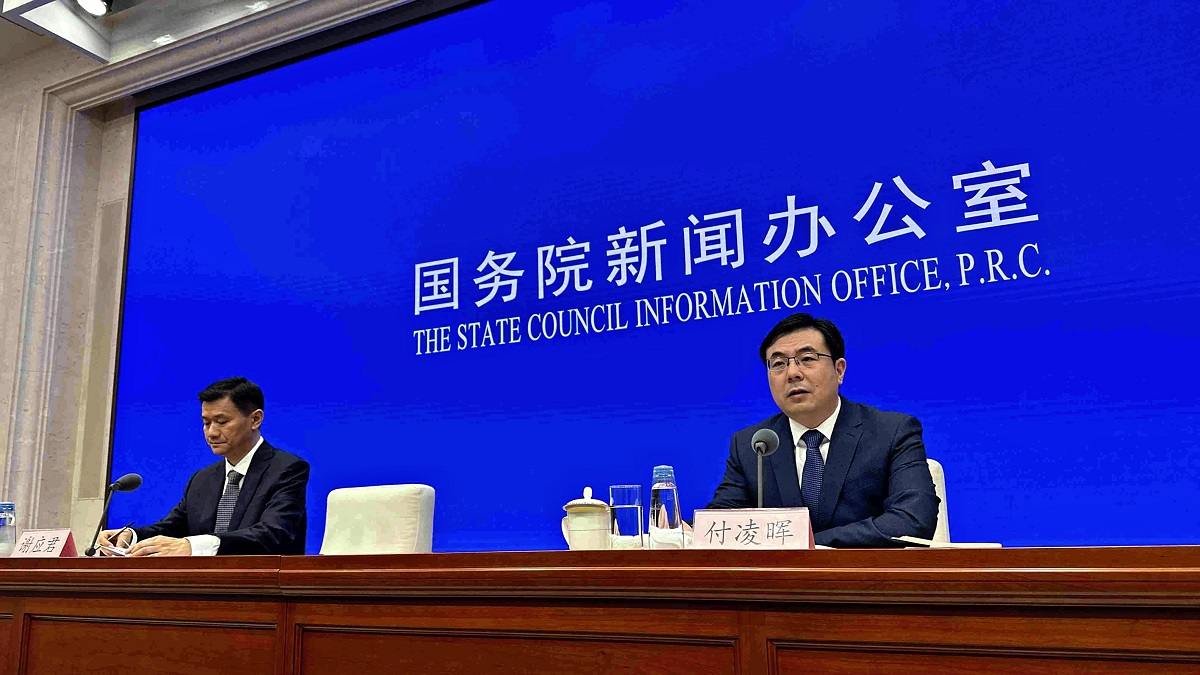
Senior officials of China’s National Bureau of Statistics hold a press conference in Beijing on Friday.
6:00 JST, September 17, 2023
BEIJING — China on Friday announced its major economic statistics for August, but did not reveal the unemployment rate for people aged 16-24 for the second time in two months.
It is likely Beijing wanted to avoid drawing attention to its domestic economic downturn and the government’s poor economic management.
A number of countries, including the United States, have recently upped their criticism of China over its lack of transparency, flagging a drop in trust in Beijing-released statistics and in the government itself.
Speaking at a Friday news conference, Fu Linghui, spokesperson for China’s National Bureau of Statistics, said employment among young people had significantly improved, based on bureau surveys and data from other departments. He also said government policies were starting to take effect.
However, in light of his reticence to detail the youth employment figure, Fu’s comments lacked gravity.
Normally, the bureau contemporaneously announces more than 100 statistics relating to such fields as real estate, consumption and production. In Friday’s announcement, the multi-generational employment rate for August stood at 5.2%, up 0.1 percentage point from July. But the bureau did not disclose the figures for 16-24-year-olds, echoing a similar lack of data for July.
China’s youth jobless figure hit 21.3% in June, marking a record high since statistics were first logged in 2018. The jobless rate normally spikes in summer when university students graduate, so it was expected that numbers would worsen for July and August.
In light of China’s “common prosperity” principle, which aims to address social and economic disparities, the administration of Chinese President Xi Jinping has driven many companies into debt or bankruptcy, including major information technology companies, often criticized for making “too much money,” and cram schools, which intensify entrance exam competition.
Such firms often serve as a fertile ground for young-generation employment, and China’s latest moves have created a tough environment for youngsters seeking work, a situation dubbed an “super employment ice age.”
“The deteriorating jobless rate among young people symbolizes the government’s policy errors,” an economist opined.
During a mid-August bureau press conference, a spokesperson said not disclosing the youth jobless figure helped better reflect the overall employment situation.
The bureau did not indicate when it would resume announcing youth jobless data.
Reality may be worse
The bureau classifies people who work more for than one hour a week as “employed.” Therefore, the actual situation can be considered to be much more serious than the numbers indicate.
A 23-year-old man from Shanxi Province, who quit his job at a local factory a year ago, presently lives in Beijing with two friends and works for a food delivery service run by major IT company Meituan.
The man makes about 6,000 yuan (about ¥120,000) a month. After paying his rent, he does not have much money left for food. He has no unemployment insurance or any other type of financial safety net. Despite applying to 10 different companies, he has not been able to land an interview for a full-time job.
Almost 20 million people in China work as non-regular food-delivery workers. The number of such workers has increased by more than 10% over the past year due to the influx of university graduates who have failed to secure employment. Additionally, the number of such young people living with and dependent on their parents has reached 16 million in urban areas alone. Such individuals are not counted as “unemployed.”
Taking these “hidden unemployed” people into account, China’s effective youth unemployment rate may actually be around 46.5%, said Zhang Dandan, an associate professor at Peking University.
Zhang also said the youth jobless rate for 16-24-year-olds could be twice as high as the figure announced by the bureau.
Opaque statistics are rampant in China. On Oct. 17 last year, the bureau unexpectedly postponed an announcement of the country’s gross domestic product, which had been slated for the following day.
At the time, data was expected to show a rapid slowdown in the Chinese economy, so the bureau focused more heavily on information related to the Communist Party of China congress.
Since 2018, the bureau has investigated 130 cases of statistical fraud — mainly by local governments — with more than 1,500 individuals being punished.
“The nondisclosure of figures sums up the bureau’s thinking regarding data that is inconvenient for the administration, and credibility in its statistics has declined further,” said Naoto Saito, chief of the Economic Research Department of Daiwa Institute of Research.
“The largest factor [in this regard] is the adverse effects of Xi’s one-man control.”
Top Articles in World
-

China Eyes Rare Earth Foothold in Malaysia to Maintain Dominance, Counter Japan, U.S.
-

Japan, Qatar Ministers Agree on Need for Stable Energy Supplies; Motegi, Qatari Prime Minister Al-Thani Affirm Commitment to Cooperation
-

North Korea Possibly Launches Ballistic Missile
-

Chinese Embassy in Japan Reiterates Call for Chinese People to Refrain from Traveling to Japan; Call Comes in Wake of ¥400 Mil. Robbery
-

Pentagon Foresees ‘More Limited’ Role in Deterring North Korea
JN ACCESS RANKING
-

Japan Institute to Use Domestic Commercial Optical Lattice Clock to Set Japan Standard Time
-

China Eyes Rare Earth Foothold in Malaysia to Maintain Dominance, Counter Japan, U.S.
-

Man Infected with Measles May Have Come in Contact with Many People in Tokyo, Went to Store, Restaurant Around When Symptoms Emerged
-

Japan, Qatar Ministers Agree on Need for Stable Energy Supplies; Motegi, Qatari Prime Minister Al-Thani Affirm Commitment to Cooperation
-

Australian Woman Dies After Mishap on Ski Lift in Nagano Prefecture






















